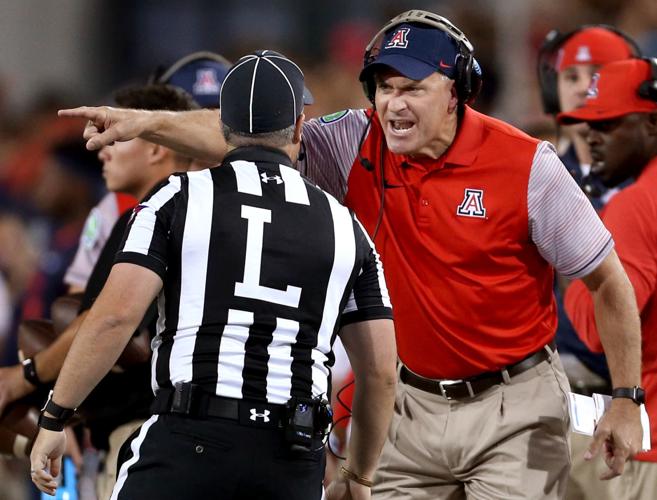The dreams come two or three times a year, usually in the summer. A coach yells as I run the hill behind my old high school. A whistle blows as I perform “up-downs” on a grass field early in the morning. Then there’s the one when I’m late for practice. That’s the worst because the punishment for being late is, well, running hills and doing up-downs.
I’m 37 years old. I played two years of high school football — terribly — more than 20 years ago. The good, and the bad, remains.
Which is why I paused when I read some of the letters submitted by our readers after Arizona fired football coach Rich Rodriguez. A $7.5 million notice of claim filed by Rodriguez’s former administrative assistant accuses the coach of sexual harassment and fostering a hostile workplace.
Some letter writers wondered if the Star knew that Rodriguez was a bully, capable of flying into a rage over a missed blocking assignment or a dropped pass; a jerk, sneering invective at those who crossed him; and a creep, reportedly sexually harassing his former administrative assistant and asking her to cover up an affair.
The answers: Yes, yes — and no.
The idea that Rodriguez may have been harassing his former administrative assistant was unknown to us until Dec. 29, when — following a news tip — we began pursuing leads that led to a story detailing the coach’s reported dirty deeds.
Is Rodriguez a bully? Star columnist Greg Hansen has written for years about Rodriguez’s imperious approach and immature attitude. The Star filmed Rodriguez following every practice and game, posting video on Tucson.com; when Rodriguez snapped or sneered, it made the news. Each of Rodriguez’s 78 games as UA coach was broadcast in high definition, and his sideline antics were often the show.
A jerk? Rodriguez was quick to anger, crass and — in some cases — downright demeaning. Hansen witnessed Rodriguez eviscerate a low-level staffer over the appearance of the words “Hard Edge” carved into the grass at Kindall/Sancet Stadium. I saw Rodriguez yelling at both players and his coaches during practice when I covered his first team, in 2012, but there was nothing that caused me to worry for their safety.
Mike Stoops, who I covered for six seasons before Rodriguez was hired, was often just as angry. Stoops would turn purple on the sideline, and he could spit when he screamed, but the words coming out of his mouth were almost always, “what are you doing?”
Rodriguez, by comparison, worked blue.
Stoops was an active, if sometimes reluctant, member of the Tucson community. Rodriguez, meanwhile, could be a mystery.
The coach kept most of the public (and media) at an arm’s length. He closed his practices and locked up the Lowell-Stevens Football Facility. UA’s administration enabled him, controlling his interactions with fans and the media: He met reporters every Monday afternoon during the season, spoke following practice every Tuesday and Wednesday, with a media relations staffer present, and was obligated to talk following every game. Certain topics — injuries being one of them — were certain to be met with a scowl or worse.
It was in the postgame sessions that we probably saw the closest thing to the “real” RichRod; losses left him angry, pouty and short with both his team and the media. Rodriguez was never worse than on Nov. 25, when he mean-mugged and glared his way through a news conference following the UA’s loss to rival Arizona State. I watched on television from the Star’s newsroom, or at least I tried to: The tension was so great that I had to look away.
RichRod isn’t alone. UA basketball coach Sean Miller pushes his players — hard — and will dismiss and demean those who question him. Andy Lopez and Mike Candrea, Hall of Famers as coaches and people, have been simultaneously loved and hated by their players. The greatest Wildcats coach of them all, Lute Olson, chased players out of practice (and off his team) annually. Years later, those same men spoke glowingly of Olson’s role in their lives.
Coaches teach lessons, pushing players out of their comfort zones. In fact, current and former Wildcats have stood up for Rodriguez to the Star’s Michael Lev, saying that his discipline and high standards were just what they needed to mature into men.
I get that: Just a few years of high school football taught me discipline, teamwork and how to respond to criticism. I learned that you get out of sports — and life — what you put into it: When I realized I didn’t have the size, skill or drive to play left tackle at University of San Diego High School, I joined the student newspaper, began writing and discovered a future career path.
I wouldn’t be here if not for a football coach who pushed me to discover some hard truths about myself. But there is a difference between tough love and bullying behavior, between a macho culture and a hostile workplace, between a “Hard Edge” and harassment.
The filing levied against Rodriguez, and his subsequent firing, was unexpected — and a reminder that those in power must be accessible, transparent and willing to engage the people who pay their salaries.
And we, as always, will be watching them.





